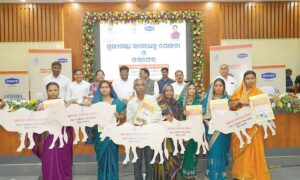
Nearly 30 km from Moradabad, dusty roads flanked by sugarcane fields lead to Kalakhera village in Joya block, Amroha district.
“The road was broken earlier and got fixed recently,” said Hemant Singh, a 65-year-old farmer. Over the years, electricity supply has improved, and sugarcane payments are now delivered in a timely manner, Singh said.
Around 15-20 sugarcane farmers in Moradabad, which goes to polls in the first phase of Lok Sabha elections on Friday, told Business Standard that conditions have improved over the last decade. However, there are still unfulfilled needs.
Singh‚Äôs 32-year-old son who now manages a polyhouse alongside him said there is no assistance even if they want to try something new.¬Ý
There is a 50 per cent subsidy to run a polyhouse. Once the project is completed, you will get the amount. ‚ÄúBut when you go to claim it, 13 per cent goes to officials and this is fixed.‚Äù¬Ý
The father and son praised the Yogi Adityanath government for safety in the state. “There is no crime and no robbery now”.
In 2022-23, agriculture accounted for 15.3 per cent of the UP’s domestic product. It was 18.4 per cent in 2012-13.
Thirty-year-old Pradeep Chaudhary who had purchased a rotavator for farming said he hadn‚Äôt received anything for two years even after submitting all the documents for subsidy.¬Ý
In a dimly lit room, he and five other farmers said the price of fertilisers and medicines used on the crops should be reduced.¬Ý
The cost of sugarcane cultivation has increased by around 74 per cent between 2011-12 and 2020-21. This includes expenses on fertilisers and manure, according to the data from the Centre for Monitoring Indian Economy (CMIE). The cost of fertilisers increased from Rs 6,079.7 per hectare to Rs 10,587.7 in the same period.¬Ý
In January, the Uttar Pradesh government raised the state-advised price (SAP) of sugarcane to Rs 370 for October 2023-September 2024.¬Ý
The farmers point to the menace of stray cattle. Either they should be in the cowshed or the price of milk should increase so that farmers keep them, Chaudhary said.¬Ý
Among their major demands are a reduction in fertiliser prices, a decline in the input cost or increase in the output cost, and soil-testing units to make the farmers more aware. Even though a unit is nearby, they don‚Äôt provide any help, they added. They also asked for an increase in warehouse facilities to diversify their crop production.¬Ý
The Centre launched the Pradhan Mantri Kisan Samman Nidhi (PM-KISAN) in 2019, under which Rs 6,000 is transferred to farmers in three instalments yearly.
While this was hailed by many, few are still left to reap the benefits. “Despite the complete submission of papers, it’s been around two years since I received the amount,” said Chaudhary.
In Jangethi village, near Meerut, Sanjay Kumar, a 45-year-old farmer, voiced strong support for Prime Minister Narendra Modi, praising his contributions to national security. Despite this, rising electricity costs and crop medicine prices were concerns.
Sonu, a 26-year-old farmer, and others flagged delays in PM-KISAN payments. Farmers in Nurnagar village, Muzaffarnagar, also complained about longstanding road issues damaging their crops. ‚ÄúIt‚Äôs been 20 years and the roads aren‚Äôt made. All the rudimentary materials then damage our crops when it rains,‚Äù said Amit Kumar.¬Ý
According to data from the National Statistical Office report released in 2021, UP was in the bottom five among 29 states regarding farmer’s income. An average farmer in the state earned Rs 8,061 between July 2018 and June 2019.¬Ý
¬Ý
¬Ý
¬Ý
First Published: Apr 15 2024 | 3:54 PM IST



